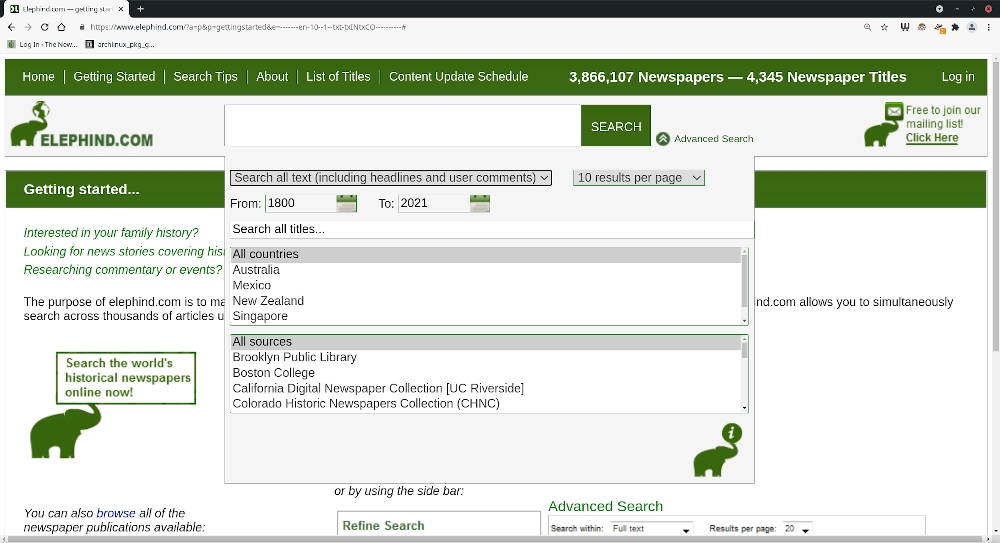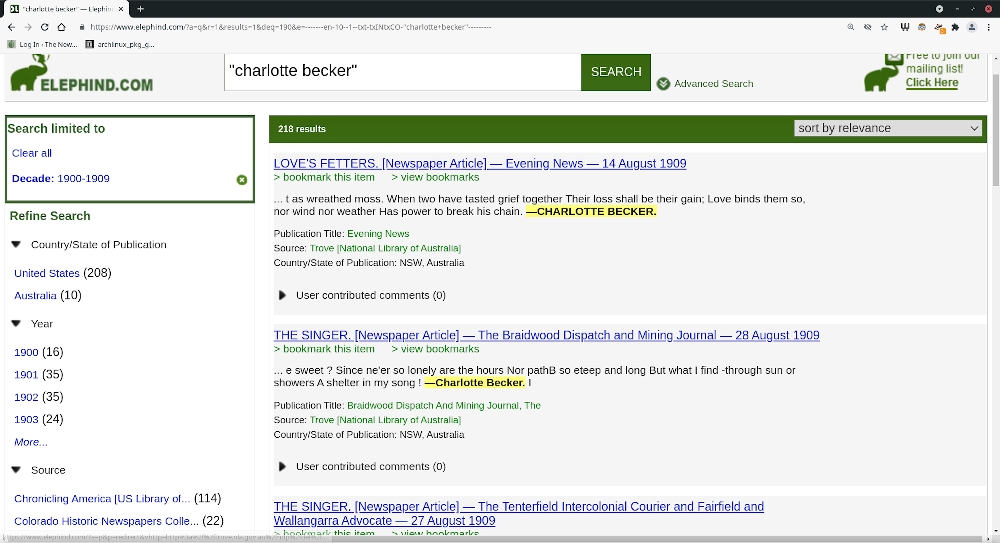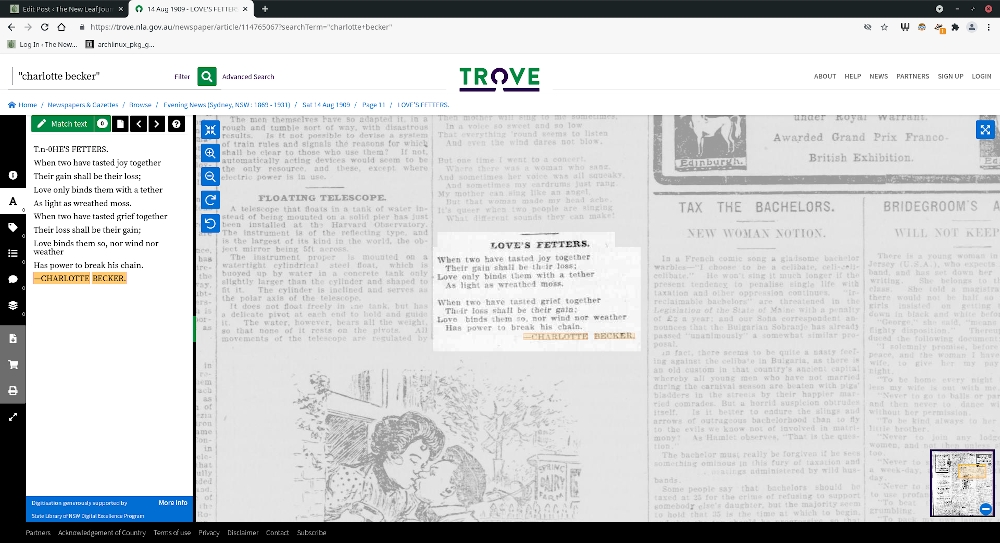November 14, 2023 Update: Elephind has sadly been taken offline. My review, presented in its original form below, is now a historical curiosity. Where possible, I switched dead links for archive links. In other cases, I removed links where there was no archived version readily available.
Several of my recent posts were aided greatly by a powerful search engine for old newspapers called Elephind. In May, I was able to find several original newspaper articles from the United States and Australia about the origins of Mother’s Day. In a late June post, I found news from the 1910s and 1920s about Reverend Charles W. Lyons, a Jesuit priest and president of four colleges. Last week, I used Elephind to find a large number of poems printed in early-twentieth century newspapers by Charlotte Becker, an active poet in her day. In this week’s Around the Web post, I will give back to Elephind for giving The New Leaf Journal some great content.
What is Elephind?
Elephind is a newspaper search engine powered by Veridian. Specifically, it searches collections of digitized newspapers. As of the writing of this article, Elephind’s index includes 4,345 newspaper titles and 3,866,107 individual newspaper issues.

Veridian provides collecting scanning and processing services to libraries and similar entities. According to its website, Elephind was originally designed as a proof of concept to test Veridian’s systems on a large amount of digitized text. Veridian now makes Elephind available to the public for the purpose of “attract[ing] the largest possible audience” to the newspaper collections of its customers.
Which Newspapers are in Elephind’s Index?
(Update: Switched to archive links in this section.)
Elephind’s newspapers derive from collections. Most of the collections are hosted by U.S. colleges. However, the largest individual source of newspapers in Elephind’s index is from the National Library of Australia, which currently accounts for just over one-third of the newspapers in its collection. In addition, Elephind hosts smaller numbers of papers ,from Mexico, New Zealand, and Singapore, and it also has a collection of Japanese-language papers that were published in the United States.
Elephind maintains a list of all of its current titles.
Searching on Elephind
I have been impressed with Elephind’s search engine in my limited use of it for projects.
Elephind’s website has a basic search syntax guide (update: link no longer available) explaining how to structure phrase queries for different purposes. In my research, I primarily relied on exact phrase searches and found them to be very effective.
After entering a search term, Elephind allows the user to further narrow the search. A search can be narrowed by time (specific date or range), country of publication, collection source, or specific publication. While these options are not unique, I was impressed with the relevancy of the results that they turned up.

I took full advantage of Elephind’s time-narrowing in my researching the origins of Mother’s Day.
Get URL
(Update: Removed URL since Elephind search no longer works.)
Most web browsers allow users to add custom search engines with search shortcuts. In order to add a custom search engine, you need the proper URL from the search engine. Elephind’s is a bit messy compared to most search bars, but you can add a basic all-text Elephind search with 10 results per page by adding the following URL to the proper location in your browser settings.
Content Adding Schedule
Elephind explains on its website that it is continuing to add newspapers to its collection. Interested searchers may sign up to receive updates on Elephind’s progress. Furthermore, Elephind invites searchers to submit suggestions for new free newspaper collections to add to the database.
Privacy Policy
I recently wrote an entire article about privacy-friendly search engines. For that reason, it is only fitting that I address Elephind’s Privacy Policy (Update: Original link not available, so you will have to take my word for what the privacy policy said).
Users who register with Elephind must submit their email address. Users may, but do not have to, submit a name. Registering with Elephind allows the user to receive occasional updates about new additions to Elephind’s collection. Elephind states that it “will never share information we collect from our Elephind.com users with any third parties.” The privacy policy does not include any additional information about what Elephind collects from people who visit its site and perform searches/
As of July 18, Elephind uses Google Analytics to collect information about visitors to its site (check its page source).
Elephind accepts donations from users who want to support its project. It states that those donations are put toward the costs of maintaining the website and adding new newspapers to the archive.
A Brief Elephind Review
I forget how I stumbled upon Elephind in the first place, but I am glad that I did. Below, I will offer my impressions of it and what I think it is useful for.

Powerful Search Engine
Elephind’s search engine turns up remarkably relevant results if your query is in its newspaper collection. When you click on a search entry, Elephind takes the user to the correct page of the newspaper and highlights where the query appears in the content.

Elephind’s searching capabilities compare very favorably to the Internet Archive’s, which can be used for some similar purposes. It is vastly superior to Project Gutenberg’s, which I note on account of Project Gutenberg having a growing magazine collection.
Useful for Specific Purposes
Whether Elephind is useful for a specific purpose, other than what one is specifically searching for, depends on what one is using it for. While Elephind does have some contemporary papers in its collection, most of its content is from the late-nineteenth and early twentieth centuries (that is my impression, at least). I have found it to be very useful for searching for information about things that were published in the early twentieth century in particular.
Regarding American papers, most of the paper’s in Elephind’s collection are local and regional papers. There is no New York Times, Wall Street Journal, or Washington Post. That did not impair my research projects – but it is worth noting to offer an idea of what is in Elephind’s collections.
Hope for the Future
Granting the limitations of its index, Elephind is already a tremendous resource, and I look forward to using it for future projects. Thanks to Elephind, I was able to bring you the story of the first informal Mother’s Day observance in Australia and many otherwise-impossible-to-find poems by Charlotte Becker. I hope that the project continues to grow and add new newspapers to the collection.
If you have a specific research interest that would have been written about in a time covered by Elephind’s collection, I recommend giving it a try and seeing what you turn up. If you have nothing specific to research, it may still be interesting to read through some of the papers in Elephind’s growing collection to learn about stories and people that would otherwise be entirely lost to posterity.
It has been a rough year for search engines I reviewed. Peekier went offline and turned into a Kagi redirect last February. But again, my review lives on.https://thenewleafjournal.com/peekier-search-engine-review/#peekier #searchengine
peekier
searchengine
Peekier Search Engine Review